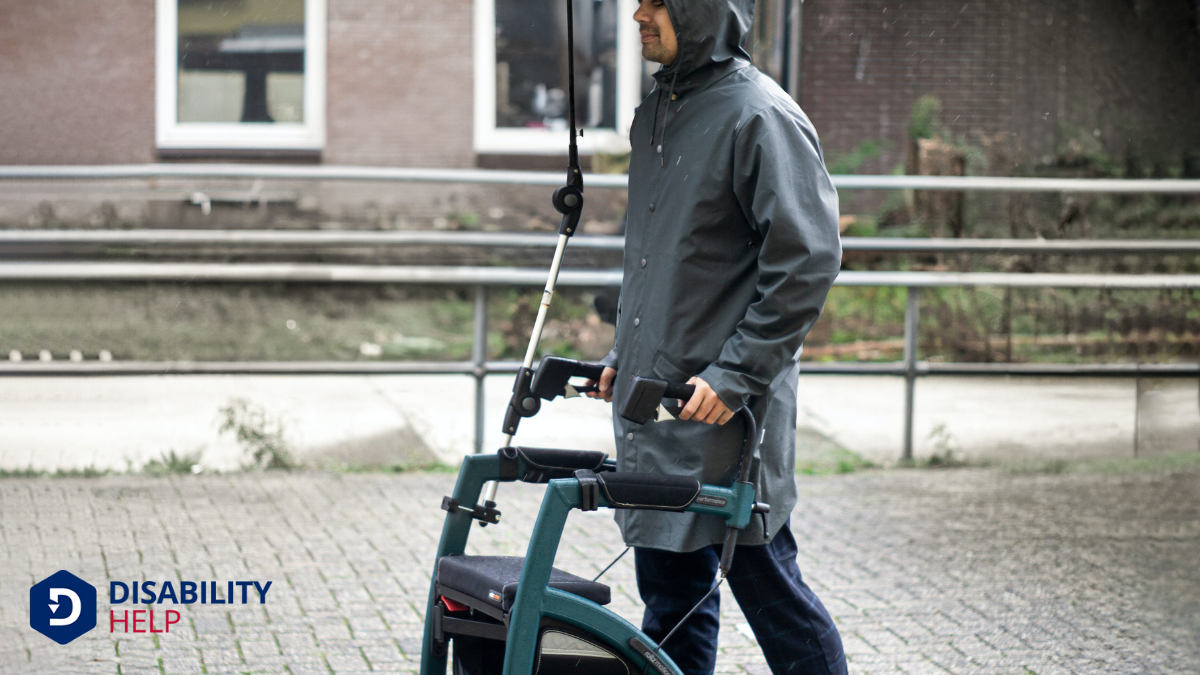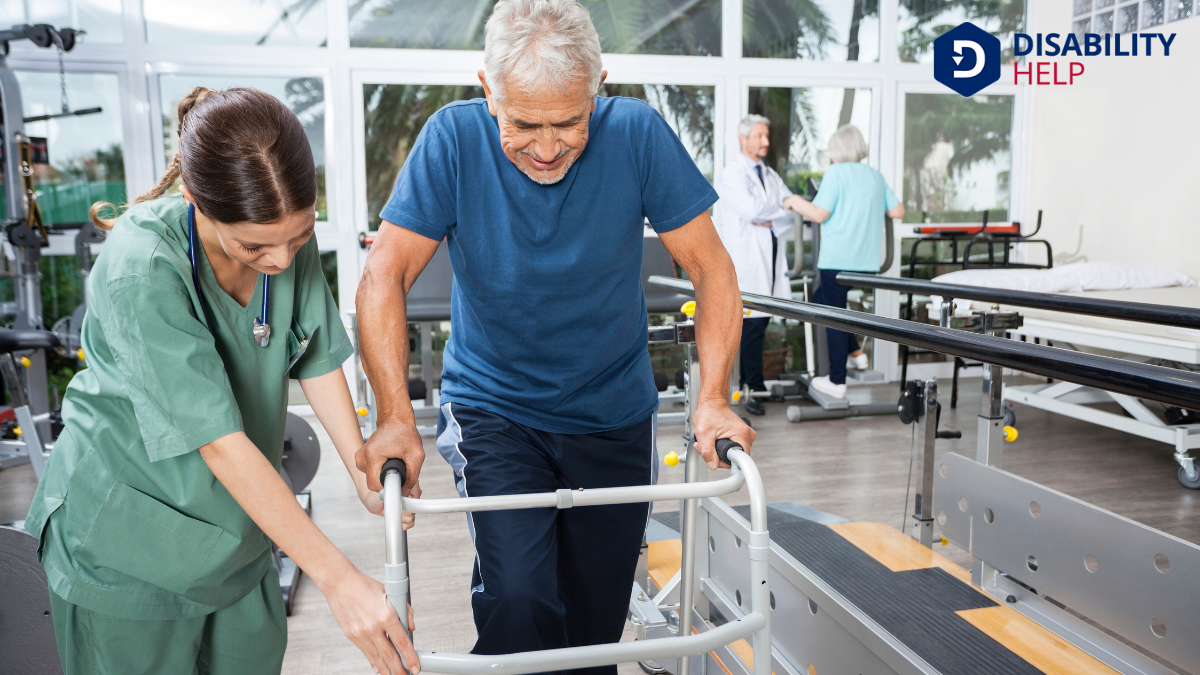When it comes to choosing the most stable assistive walking device, we often find ourselves weighing various options. Stability is essential, especially for those of us facing significant mobility challenges. While canes and crutches offer support, walkers stand out due to their four-point ground contact. They provide unmatched stability, but are they truly the best choice for everyone? Let's explore the factors that might influence our decision.
Key Takeaways
- Walkers provide unmatched stability with a sturdy frame and four contact points, ideal for uneven surfaces.
- Quad canes feature a wider base, offering more support and improved stability than standard canes.
- Rollators combine a walkerA mobility aid with a metal frame and sometimes wheels, used by individuals who need additional supp... with wheels and a seat, providing enhanced stability over longer distances.
- Knee walkers offer stable support for lower leg injuries by allowing the leg to rest while moving.
- Crutches shift weight from legs, offering stability and maneuverability with non-slip tips for traction.
Understanding Mobility Challenges
When we talk about mobility challenges, it’s essential to recognize how they impact everyday life and independence. Maneuvering spaces that others find easy can become intimidating and exhausting for those with mobility limitations.
We often take for granted the simple act of walking, yet it becomes a major hurdle when faced with these challenges. This affects not only physical movement but also our emotional well-being and social interactions, sometimes leading to isolation or frustration.
Understanding these challenges helps us appreciate why individuals seek solutions to regain control over their mobility. By acknowledging the difficulties, we can foster empathyThe ability to understand and share the feelings of another, particularly important in understanding... and support each other in seeking effective strategies.
Together, we can explore ways to enhance mobility, ensuring everyone has the opportunity to maintain their independence and quality of life.
Types of Assistive Walking Devices

Recognizing the impact mobility challenges have on daily life, we now turn our attention to the various types of assistive walking devices available to support independence and ease of movement.
These devices cater to different needs and provide varying levels of stability and support. Understanding the options helps us choose the right one to enhance our mobility and confidence.
Let's explore the main types:
- Walkers: Provide stability with a sturdy frame and are ideal for those needing significant support.
- Rollators: Combine a walker with wheels for those who need support but have enough balance to maneuver easily.
- Crutches: Assist individuals with temporary injuries by shifting weight from the legs.
- Knee walkers: Offer an alternative to crutches for lower leg injuries, allowing more comfortable mobility.
Each device has unique features tailored to diverse needs.
The Basics of Canes and Their Stability
Although assistive walking devices vary widely, canes remain one of the most versatile and commonly used options. As we explore canes, let’s focus on their basic structure and how they contribute to stability.
A caneA mobility aid used to assist with balance and walking. typically consists of a handle, shaft, and tip. The handle offers a comfortable grip, while the shaft provides support. The tip, usually made of rubber, guarantees a firm grip on various surfaces, reducing the risk of slipping.
Canes are especially beneficial for those needing minimal support to maintain balance or reduce weight on a lower limb. By offering increased stability, they help us confidently navigate daily activities.
Adjustable canes allow us to customize their height, guaranteeing proper posture and maximizing comfort. Let’s consider how canes enhance our mobility.
Exploring Crutches for Enhanced Support
While canes provide a great starting point for mobility assistance, crutches offer enhanced support for those who need more stability. They’re designed to help us maintain balance and reduce the weight placed on our legs.
Crutches can be particularly useful after an injury or surgery, and they’re adjustable to fit different heights, ensuring proper posture and comfort.
When we consider crutches for enhanced support, we should focus on a few key aspects:
- Material: Lightweight materials like aluminum or carbon fiber ease maneuverability.
- Grip: Comfortable handgrips reduce strain on our hands and wrists.
- Base: Non-slip tips increase traction and prevent slipping, offering greater confidence.
- Fit: Properly fitted crutches reduce the risk of underarm discomfort and improve usability.
Walkers: A Comprehensive Look at Stability

For those seeking unwavering stability, walkers are a game-changer in the realm of assistive walking devices. They provide a solid frame and four points of contact with the ground, offering unmatched support for those who need it most.
We can rely on walkers to keep us steady, especially on uneven surfaces or during longer periods of walking. Their design guarantees that we've a broad base of support, which considerably reduces the risk of falls.
Walkers are versatile, too. We can easily adjust their height to suit our needs and use them indoors or outdoors.
The simplicity of their structure makes them user-friendly, allowing us to focus on our mobility without worrying about losing balance. Regarding stability, walkers truly stand out.
Rollators: Balancing Mobility With Stability
When we consider rollators, we find a perfect blend of mobility and stability, thanks to their adjustable height features and enhanced wheel design.
These aspects allow us to customize the rollator for ideal comfort and maneuverability, catering to our specific needs.
Let's explore how these innovations make rollators a reliable choice for those seeking both support and ease of movement.
Adjustable Height Features
Finding the right rollator can be transformative, especially if it includes adjustable height features that cater to our unique needs.
The ability to adjust the height guarantees that we maintain proper posture and reduce strain on our backs and joints. This feature provides a personalized fit, enhancing comfort and stability during use.
When choosing a rollator, we must consider how easily the height can be adjusted and locked into place for consistent support.
With adjustable height features, we can enjoy:
- Improved comfort: Customizing the rollator to our height reduces discomfort.
- Enhanced safety: Proper alignment helps prevent potential falls.
- Increased confidence: Personalized adjustments promote independence.
- Easy adaptability: Accommodates changes in our needs over time.
These features guarantee our rollator not only supports but also empowers us.
Enhanced Wheel Design
Adjustable height is just one aspect of a rollator's design that influences its effectiveness.
Another vital factor is the enhanced wheel design. As we explore rollators, let’s consider how wheel design impacts stability and mobility. Larger wheels can navigate uneven surfaces with ease, providing a smoother ride and reducing the risk of tipping. Additionally, wheels made from high-quality materials like rubber or polyurethane offer better grip and durability.
We should also look at wheel configuration. Swiveling front wheels enhance maneuverability, allowing us to turn corners effortlessly in tight spaces.
Meanwhile, locking mechanisms on the wheels provide added security when we need to pause and rest. By understanding these features, we can select a rollator that balances our need for mobility and stability.
Specialty Walking Devices for Unique Needs
Let's explore how specialty walking devices cater to specific needs, offering solutions like all-terrain walking aids for those who navigate varied environments.
These devices guarantee stability on different surfaces, while balance-enhancing devices support those who need extra help maintaining equilibrium.
Together, they expand our options for safe and confident mobility.
All-Terrain Walking Aids
When it comes to maneuvering diverse terrains, all-terrain walking aids stand out as essential tools for those with unique mobility needs.
These devices cater specifically to outdoor enthusiasts who face challenges on uneven paths, grassy fields, or sandy beaches. We recognize the importance of stability and versatility in these aids, guaranteeing they support your adventurous spirit without compromising safety.
Consider these features when selecting an all-terrain walking aid:
- Wide, durable wheels: They provide smoother movement over rough surfaces.
- Adjustable height: Customization guarantees comfort and proper posture.
- Lightweight frame: Easier to handle and transport across various terrains.
- Sturdy grip handles: They offer better control and reduce the risk of slipping.
Balance-Enhancing Devices
Balance-enhancing devices play an essential role for individuals with unique mobility needs, providing stability and confidence in each step.
When balance is a concern, these devices offer specialized support, helping us navigate daily life with ease. Whether it's a quad cane or a rollator, each option is designed to meet specific requirements, ensuring we feel secure.
Quad canes, for instance, have a wider base, offering more support than standard canes. They're perfect for those who need extra stability without compromising maneuverability.
Rollators, on the other hand, provide a seat for resting and are ideal for longer distances.
Factors to Consider When Choosing a Device

Choosing an assistive walking device requires careful consideration of several key factors to guarantee it meets your needs effectively.
First, we should evaluate the device's stability, ensuring it offers adequate support for our unique balance requirements. Personal comfort is essential, as we’ll rely on this device daily; it should fit our hands and height comfortably.
The device’s weight is another significant factor—too heavy, and it could be cumbersome; too light, and it might lack stability.
Finally, consider the environment where we’ll use the device, as different surfaces demand different features.
- Stability: Does it provide the support you need?
- Comfort: Is it comfortable for daily use?
- Weight: Is it manageable for you?
- Environment: Is it suitable for your usual surfaces?
Expert Recommendations for Optimal Stability
Understanding the factors that influence our choice of an assistive walking device paves the way to expert insights on achieving ideal stability.
Experts suggest focusing on the device’s weight distribution, grip, and the user’s specific needs. A device that’s too light might lack stability, while a heavier one could be cumbersome. We should prioritize adjustable height and ergonomic handles to guarantee comfort and control.
Consulting with a physical therapist can guide us in selecting a device tailored to our gait and balance requirements.
Additionally, experts recommend trialing different devices to see which offers the best support. Stability isn’t one-size-fits-all; it’s a personal journey.
Conclusion
In our exploration of assistive walking devices, we've seen how each option offers unique benefits. However, when it comes to stability, walkers consistently stand out. They provide unmatched support, helping those with significant mobility challenges navigate safely. As we consider our own or a loved one's needs, it's essential to weigh factors like stability, mobility, and personal comfort. By doing so, we'll guarantee the choice enhances independence and quality of life. Let's prioritize safety and confidence in every step.






